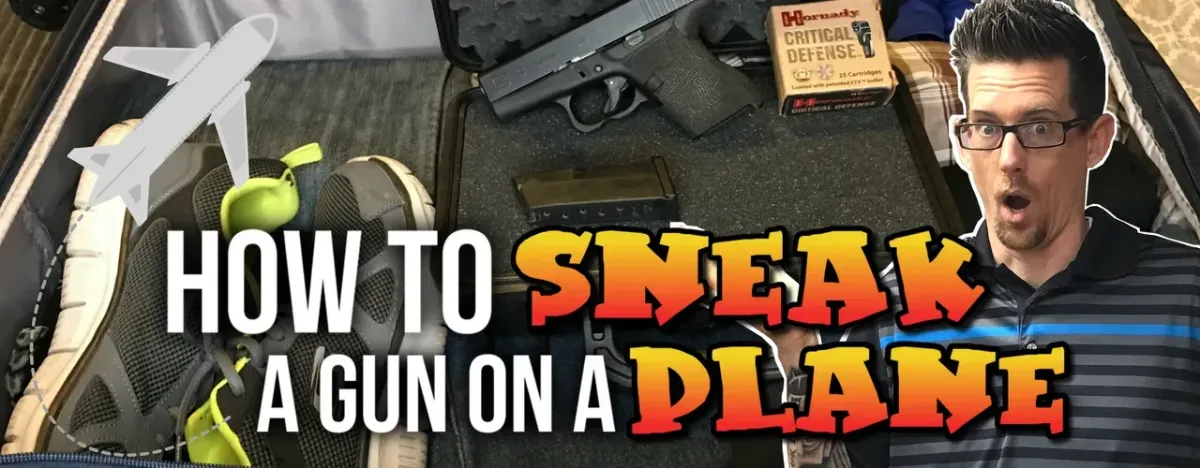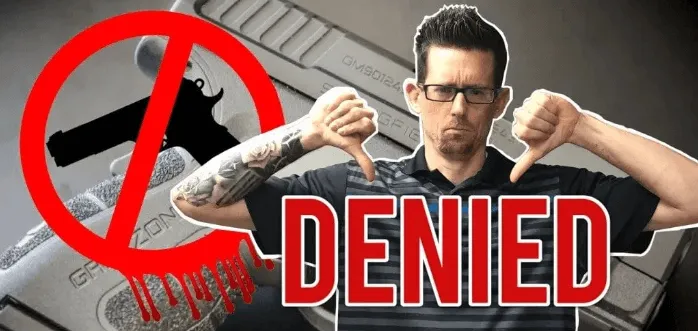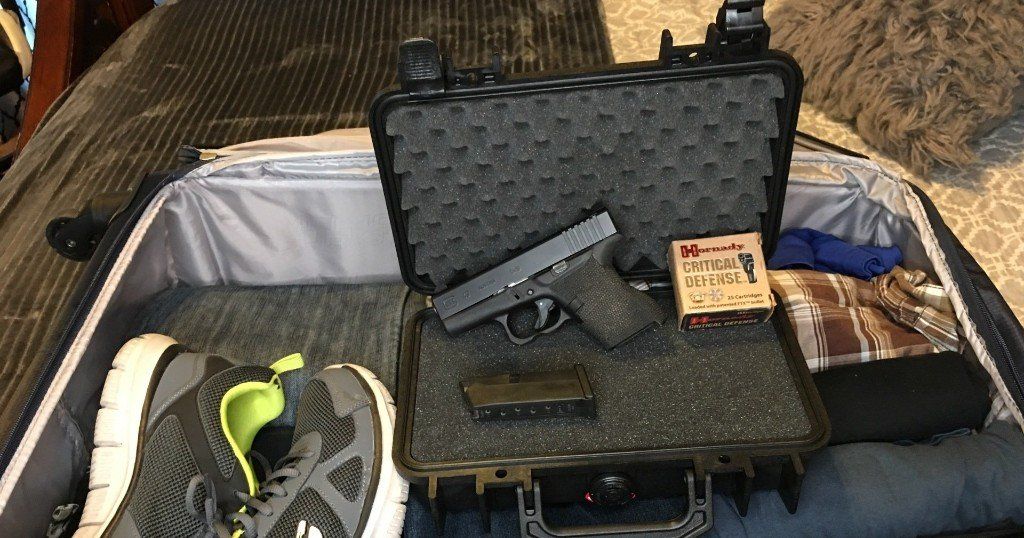Florida Concealed Carry Law Blog
Follow Us for News, Tips , Tricks, Guns Gear and Real Life Stories

Traveling with a Firearm on an Airplane
Traveling with a Firearm on an Airplane
What’s Up Sheepdogs? Ryan here with Tampa Carry.
Traveling with a Firearm on an Airplane with or without a concealed weapons permit.
https://www.tsa.gov/travel/transporting-firearms-and-ammunition
Many people are shocked to learn that you can transport a firearm while on an airplane. Of course TSA has some very specific rules that must be followed.
The firearm(s) must be unloaded and placed in a locked hard sided container as checked baggage only.
Locked Hard Sided Case
The case cannot be easily pried open
The case must completely secure the firearm from being accessed
***Alert - The container the firearm was in when purchased may not adequately secure the firearm
Can You Travel on an Airplane with a Firearm?
I know this sounds crazy, but it is lawful to travel by air with a firearm. The process is relatively simple, but it does require a little research and preplanning.
TSA's Policy
The firearm must be unloaded and placed into a hard plastic or metal case that cannot be easily pried open. The case must be locked with a combination or key lock. It's also important to note that you must have locks for each place your gun case allows them. Firearm magazines, loaded or un- loaded, and ammunition must be included with the hard case containing your unloaded firearm.
Section 49 of the Code of Federal Regulations 175.10 states that the ammunition must be packed in the original packaging, or it must be in a case specifically designed to hold ammunition. Surprisingly, you can travel with up to 11 pounds of ammunition. I'm not sure why or how they came up with that number, but that's the rule.
Your Airline's Policy
You need to research the firearm transportation policies for your airline. Sometimes your airline's policies will be stricter than the TSA guidelines. I also recommend that you print a copy of the TSA's firearm transportation policy and your airline's policy before heading to the airport.
I have heard countless stories of airline workers not understanding their policies and calling airport police when someone declares that they have a firearm in their luggage.
Laws of Your Final Destination
Finally, you need to research the firearm and ammunition laws of your final destination. If you have a Florida concealed weapons permit and you're traveling to a reciprocal state, you know that the process will be easy. However, if your final destination is not a reciprocal state, you need to exercise a lot of caution.
California, Illinois, New York, New Jersey, Connecticut, and Massachusetts have some of the strictest firearms laws in the nation and love to issue weapon violation fines.
Whichever state you're traveling to, make sure you complete your research. Don't wing it; you need to know the laws before your trip begins.
If you're traveling outside of the United States, you must research the firearm importation laws of the country you’re going to visit, as well as the U.S. Customs and Border Protection guidelines for the temporary exportation of a firearm.
Process
When you arrive at the airport, you must immediately declare your firearm to your airline or TSA personnel, whichever comes first. The way I do this is by asking for a firearms dec- laration card. This is a subtle way of informing the individual that I have a firearm.
You want to avoid saying something like "I have a gun.” This could cause confusion.
Once you declare your firearm and receive your boarding pass, you will be escorted to a TSA inspection area where one of two things will happen. Either a TSA agent will run your bag through a metal detector and give you the all-clear or the TSA agent will request your keys to unlock and physically inspect your firearm.
They will run chemical swabs and en- sure the firearm is being transported according to federal law. Once the inspection is complete, you will be free to leave.
I'm sure you can understand it's important to give yourself extra time so you don't miss your flight. After your flight, you will pick up your luggage from the baggage service office of your airline. Here they will verify your ID and release the firearm to you.
All in all, the process is pretty simple if you're prepared.
Transporting A Firearm Across State Lines
The Firearm Owners Protection Act, or FOPA, protects lawful firearm owners who are transporting firearms from local authorities who may prohibit passage.
18 U.S.C 926A Interstate transportation of firearms Notwithstanding any other provision of any law or any rule or regulation of a State or any political subdivision thereof, any per- son who is not otherwise prohibited by this chapter from transport- ing, shipping, or receiving a firearm shall be entitled to transport a firearm for any lawful purpose from any place where he may law- fully possess and carry such firearm to any other place where he may lawfully possess and carry such firearm if, during such trans- portation the firearm is unloaded, and neither the firearm nor any ammunition being transported is readily accessible or is directly accessible from the passenger compartment of such transporting vehicle: Provided, That in the case of a vehicle without a compartment separate from the driver's compartment the firearm or am- munition shall be contained in a locked container other than the glove compartment or console.
This does not stop some states from arresting you for violating state law. New York is notorious for arresting people for violating state law, even if they are in compliance with federal law. My personal opinion is you should verify each anti- American state and jurisdiction’s firearm transportation laws before going there. These anti-American states include New York, New Jersey, Massachusetts, Maryland, Connecticut, California, Rhode Island, and Illinois. If you can avoid driving through a state with strict gun laws, you should.
In 2018, I received a phone call from a criminal defense attorney in New York City. He informed me that a man who re- sides in Tampa was just arrested in New York for a weapons violation.
He explained that this individual traveled to New York by vehicle to visit family, and he brought along his Glock 19 for protection during his road trip. While in New York, he received troubling news and had to hop on a plane and head back to Tampa immediately.
He declared his firearm at the airport and was brought into the secondary inspection area. When the TSA agent realized this individual had an unlawful firearm under New York law, he was immediately arrested.
I worked with this criminal defense attorney for months attempting to create a package of firearm safety courses and volunteer opportunities for this individual to complete to avoid a jail sentence. After several months, this individual was convicted and sentenced to three years in a New York state prison.
Unfortunately, this entire situation could have been avoided if he had completed 10 minutes of research. He would have known that what he was doing was unlawful, but because he decided to wing it, he's sitting in a cage. Please learn from his mistake and develop a strong understanding of the firearm laws for each state you intend to visit before you enter.
How to Prepare for Your Trip
As you're planning for your trip, it's imperative to research the firearm laws for each state you will enter. Thankfully, there are several websites available to assist you with this.
What You Need To Do Before Bringing Your Gun To Another State
Here is a list of questions you must find the answers to be-fore entering a new state:
What are the requirements for transporting a firearm through this state?
Is my firearm lawful to possess in this state?Is hollow-point ammunition allowed in this state?
In what places am I prohibited from carrying concealed?
Can I carry in a restaurant that serves alcohol?
What are the state requirements if stopped by the police?
What firearms or weapons can I lawfully carry concealed?
What are the laws on the use of deadly force?
Do I have to obey "no guns allowed" signs at a business?
If traveling with multiple firearms, how do non-concealed firearms need to be stored in my vehicle?
Does this state have a “stand your ground” provision? What are the rules?
Does this state have a castle doctrine? What are the rules?
Does this state have a retreat rule?
Does this state have a preemption law?Delta Airlines Firearm Policy
United Airlines Firearm Policy
American Airlines Firearm Policy
Southwest Airlines Firearm Policy
Here's a great video to watch where I go into more detail.
That's all I have for today. So until next time keep training and stay safe...
Ryan G. Thomas
P.S. You’re one step away from getting your Florida concealed carry permit. We make it fast and easy. Click here to get started...
Don't Miss a Thing!
Get Notified When We Post a New Article
Most Popular Concealed Carry Articles

Florida Private Gun Sales Rules

Am I Eligible For A Florida Concealed Carry Permit?
Get FREE Access To The Florida Concealed Carry Masterclass™
Join over 60,000 Floridians Who Chose Tampa Carry To Get Their Florida Concealed Carry Permit
All rights Reserved. Copyright 2025 Tampa Carry




